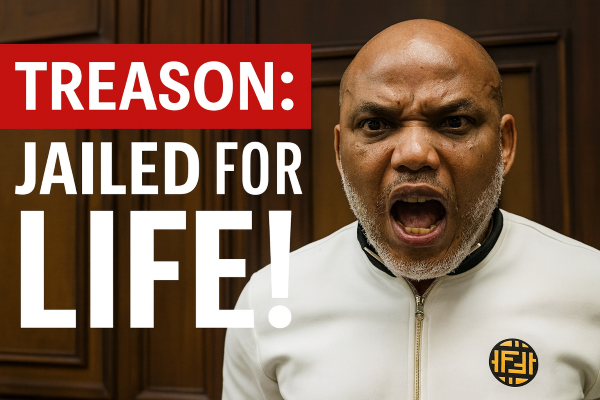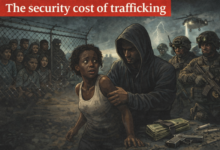
In a dramatic climax to one of Nigeria’s longest and most contentious criminal trials, the Federal High Court in Abuja has sentenced Nnamdi Kanu, leader of the proscribed Indigenous People of Biafra (IPOB), to life imprisonment for terrorism-related offences.
Delivered by Justice James Omotosho after a marathon judgment session, the ruling has become the legal and political lightning rod of 2025, splitting national sentiment, deepening geopolitical debates, and placing Nigeria’s criminal justice system under global scrutiny.
This is the full investigative timeline, capturing the arrests, escapes, renditions, courtroom battles, judicial controversies, political pressure points, and the arguments now shaping the appeal trajectory.
I. THE BEGINNING (2015): ARREST, CHARGES & THE SEEDS OF A LONG LEGAL WAR
Nnamdi Kanu’s legal odyssey began in October 2015, when he was first arrested on allegations of treasonable felony, inciting broadcasts, and unlawful importation of a radio transmitter.
His detention marked the start of a highly politicised trial, one that immediately exposed deep ethnic, constitutional, and security fractures across Nigeria’s justice system.
Early Courtroom Battles
- Several judges withdrew from the case—Justices Ahmed Mohammed, John Tsoho and Binta Nyako—after repeated accusations of bias by Kanu and his legal team.
- The trial stalled repeatedly, grinding through procedural deadlocks and constitutional challenges.
2017: Bail, Escape & The 4-Year Gap
Nnamdi Kanu was granted bail in April 2017, only to flee Nigeria months later following a military raid on his Afara-Ukwu residence in Abia State.
This triggered:
- A 4-year interruption of trial
- Intensified security tensions in the South-East
- Escalation of IPOB activities and sit-at-home orders
II. JUNE 2021: THE EXTRAORDINARY RENDITION FROM KENYA
In June 2021, Nnamdi Kanu was forcibly captured in Kenya and flown back to Nigeria in what courts later described as an “illegal, unfair and oppressive” extraordinary rendition.
The rendition became:
- A major constitutional flashpoint
- A diplomatic incident involving Kenya, Nigeria and the UK (given Kanu’s British citizenship)
- The backbone of several failed attempts to dismiss charges
Despite acknowledging the illegality of the rendition, the Supreme Court ruled in 2023 that:
“Illegality of arrest does not invalidate charges.”
This ruling reopened the door for the terrorism trial to resume.
III. 2023–2024: TERRORISM CHARGES, NO-CASE SUBMISSION & LEGAL GRIDLOCK
Upon return to court, the Federal Government amended the charges to include terrorism-related offences tied to:
- Inciting violence
- Targeting security personnel
- Ordering sit-at-home enforcement
- Teaching followers to make Molotov cocktails
- Wanton destruction during the #EndSARS period
- Illegal importation of a radio transmitter
June 2024:
The prosecution closed its case after calling five witnesses.
September 2024:
Kanu filed a no-case submission, insisting the charges were invalid and based on a repealed law.
The court rejected the submission.
IV. 2025: DEFENCE WITHDRAWAL, SELF-REPRESENTATION & COURTROOM CLASH
Rather than open defence, Kanu dismissed his lawyers and insisted:
- The charges were invalid
- The law used was repealed
- The court lacked jurisdiction
- He would not defend himself
The case repeatedly stalled.
On Judgment Day, Kanu clashed with Justice Omotosho, claiming:
“You cannot proceed. You don’t know the law.”
He was ordered removed from the courtroom.
V. THE JUDGMENT: WHAT THE COURT FOUND
Justice Omotosho convicted Kanu on six of the seven terrorism counts.
Life Imprisonment on Counts 1, 4, 5, 6
The court held that:
- Sit-at-home declarations were acts of terrorism
- Threats, killings, and enforcement violence stemmed from Kanu’s broadcasts
- His online statements amounted to incitement and terror coordination
20 Years for Membership of a Terrorist Organisation
For identifying as IPOB leader after proscription.
5 Years for Illegal Equipment Importation
For concealing a radio transmitter in a container marked “used household items.”
All sentences run concurrently.
VI. THE CONTROVERSIES: WHAT LEGAL GURUS, ACTIVISTS & CRITICS SAY
Legal analysts have flagged multiple red flags:
1. Jurisdiction Question Was Never Decided
A court must establish jurisdiction before trial.
Kanu raised it—
The judge avoided ruling on it.
2. Judge Blocked Final Address
He told Kanu to raise objections in his final address,
then later refused to allow one.
3. Charges Based on Repealed Law
Prosecution relied on the Terrorism Act 2013, repealed in 2022.
4. Evidence Invented?
Critics say the judgment referenced allegations against Nnamdi Kanu (bombing foreign embassies) never led in evidence.
5. Extraordinary Rendition Ignored
The court refused to rule on double criminality or illegality of rendition.
6. Fair Hearing Violations
Under Nigerian law, once fair hearing is violated, the judgment becomes void.
VII. MAZI NNAMDI KANU’S WIFE: HER RESPONSE
Kanu’s wife delivered a blistering public analysis, stating:
- The judgment is “null and illegal.”
- The judge used “trickery” to block Kanu’s address.
- Evidence was fabricated.
- Jurisdiction was never settled.
- The law used was “dead.”
Her breakdown has gone viral, intensifying public debate.
VIII. PUBLIC OPINION: HOW NIGERIANS ARE REACTING
Across social media, legal forums and regional communities:
- Some hail the judgment as a victory for national security
- Others describe it as judicial overreach
- Supporters call it political persecution
- Legal scholars warn it may collapse on appeal
- Communities in the South-East say it deepens alienation
IX. THE PATH TO FREEDOM: WHAT NEXT?
Possible Appeal Grounds
- Lack of jurisdiction
- Fair hearing breaches
- Use of repealed law
- Inadmissible or invented evidence
- Violations of constitutional procedure
- Extraordinary rendition irregularities
Potential Outcomes
- Sentence reduction
- Fresh trial
- Acquittal on technical grounds
- Upholding of life imprisonment
Political negotiation remains a parallel possibility.
X. BRANDECONOMY INSIGHT: WHAT THIS CASE MEANS FOR NIGERIA
Nnamdi Kanu’s trial is now:
- The most consequential terrorism case since Boko Haram prosecutions
- A test of Nigerian judicial independence
- A referendum on fair hearing safeguards
- A geopolitical issue involving the UK, Kenya and international law
- A pressure point in Nigeria’s fragile federal structure
The judgment will reshape:
- Ethno-political agitation
- Digital extremism regulation
- Counter-terrorism jurisprudence
- Nigeria’s global human rights reputation
Nigeria’s democracy is again on trial, and the appeals process will determine what remains of public trust.












